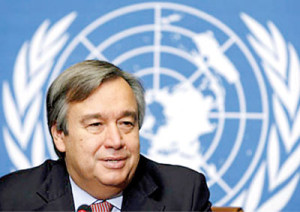UNHCR changing leaders at critical juncture
World refugee body UNHCR faces a critical change of leadership at a time when it is confronting the largest global humanitarian crisis since the end of WWII.
António Guterres, a former Portuguese Prime Minister who has served as the UN High Commissioner for Refugees since June 2005, will be replaced by a new High Commissioner at the end of this year.
The change comes as the number of displaced people around the globe has topped 60 million, and more people are being driven from their homes by wars and persecution than ever before.
Observers of the refugee sector say Guterres will be a hard act to follow.

UN High Commissioner for Refugees, António Guterres, will be replaced by a new High Commissioner at the end of 2015.
Under his tenure, UNHCR has responded to numerous refugee emergencies from Afghanistan to Somalia and now Syria.
The agency has increased its annual budget from just under $1 billion in 2005 to $7 billion in 2015, partly as a result of a needs-based budgeting approach introduced in 2010.
Guterres has also led the push to reduce the number of staff working at the agency’s headquarters in Geneva, and to reallocate resources to field operations.
Despite criticisms of the UN as it celebrates its 70th anniversary this month, including its overwrought bureaucracy, escalating budgets and failure to intervene to prevent atrocities, the UNHCR remains highly regarded.
It is widely recognised as having had a positive impact on the lives of millions of refugees, through its field operations and through its efforts to advocate for their rights.
The High Commissioner’s role is to manage a complex worldwide operation with more than 9,300 staff in 123 countries. It involves making sure that refugees receive the international protection they’re entitled to under the 1951 Refugee Convention.
But the role also involves pressuring governments to comply with the convention, and to treat refugees humanely it has to be done with an awareness that the agency cannot function without voluntary contributions from governments.
“Guterres has been successful because he’s a skilled politician,” said one observer.
It has been suggested that extending Guterres’ term by another year, on top of the six months it has already been extended, would have provided crucial continuity at a critical time in the agency’s history.
And some reports say that several nations supported the idea of Guterres staying on and that he himself expressed a willingness to continue for another year but that UN Secretary-General Ban Ki-moon did not take him up on the offer.
Candidates can apply independently for the job but more often they are nominated by agencies or their own governments. So far, the only nomination to surface is that of Helle Thorning-Schmidt, former Prime Minister of Denmark.
But her nomination has not been welcomed by refugee rights groups who point out Denmark’s recent slashing of social benefits for newly arrived refugees and that earlier this year Ms Thorning-Schmidt ran for re-election on an anti-migration platform.
Filippo Grandi, former head of UNRWA, the UN’s agency for Palestinian refugees, is also tipped to run for the post. He has considerable experience in the refugee and humanitarian sectors but has never held political office in his home country of Italy.
The next step will be for Ban Ki-moon to convene an interview panel made up of senior UN officials and one representative from outside the UN.
By October, there is expected to be a shortlist of three candidates, one of whom will be a woman. After consulting with key member states, he will recommend one candidate who will then have to be endorsed by the UN General Assembly.
In the end, as is the case with most UN appointments, the result will depend on backroom deals between the major regional powers.
Cesira Colleluori
AMES Australia Staff Writer












